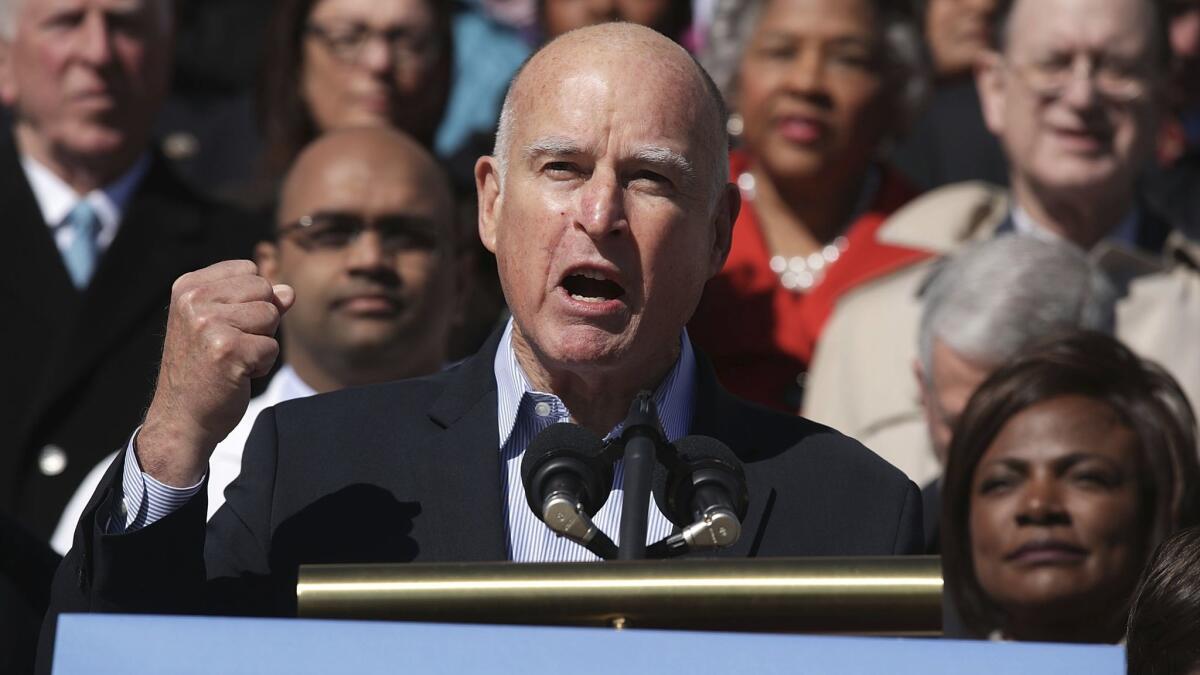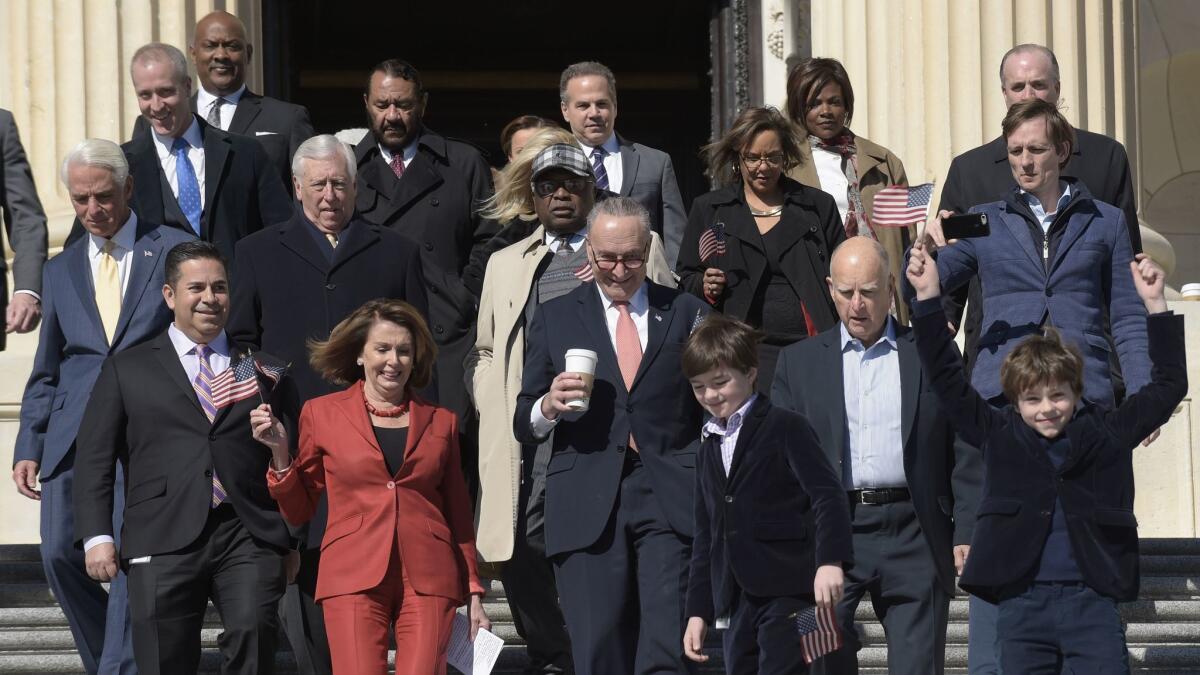With his governing legacy on the line, Gov. Jerry Brown dives in to Washington’s healthcare debate

Reporting from Washington — The oratory that made Gov. Jerry Brown a rising political star in his youth returned on Wednesday as he joined Democrats on Capitol Hill in rebuking President Trump and congressional Republicans for efforts to dismantle the nation’s sweeping, 7-year-old healthcare law.
Brown’s fury, though, had some extra fuel: A new analysis by his advisors showed that the GOP effort to repeal and replace the Affordable Care Act would blow a $6-billion hole in California’s budget in just three years, a significant threat to the governor’s legacy as the architect of the state’s newfound fiscal stability.
It was enough to get Brown hot under his tie-less shirt collar on Wednesday morning as he stood at a lectern on the U.S. Capitol’s east steps, as a late addition to a healthcare rally led by former Vice President Joe Biden and other top Democrats.
“Mr. Trump,” he said, “come down from Trump Tower, walk among the people and see the damage that this latest exercise in raw political power will wreck on the women, the men and the children of this country.”
Brown’s administration has warned for weeks that California stands to lose a lot under any downsizing or repeal of Obamacare. The most significant cut would be to funds covering healthcare for 4 million people that the law brought into Medi-Cal, the state’s version of the federal Medicaid program for the poor.
“This raises lots of questions about how we would finance the Medi-Cal program going forward,” Mari Cantwell, director of California’s Medicaid efforts, said in a conference call with reporters.
The state analysis, unveiled about an hour before the governor spoke at the rally Wednesday, estimates the $6-billion hit to be just the beginning of California’s potential problems after a repeal of former President Obama’s signature law. By 2027, California’s healthcare program for the poor would lose $24.3 billion in annual federal assistance. While most of those dollars are currently paid to state government, almost $6 billion would come from payments made to counties and health providers.
For the state, the single biggest hit would come from how the GOP legislation downsizes its existing healthcare subsidies. Those who were covered under the Affordable Care Act’s expansion of Medicaid would have to prove their income eligibility every six months.
Failure to provide the documents would mean no coverage — and no subsidy.
“That process, in many cases, has been an administrative barrier [for the poor],” said Jennifer Kent, director of the California Department of Health Care Services.
The state would receive smaller subsidies if the same Californians later become re-eligible for Medi-Cal due to their income. That process alone accounts for some 53% of the dollars California would lose under the Republican proposal, according to the analysis. State officials called it a fundamental rethinking of the Medicaid law enacted in 1965.
“This is devastating,” Brown said in an interview after his Capitol speech. “It’s a disgrace, and it’s an insult to democracy itself.”
The address also marked a shift in the tone and temperament exhibited by the governor on his visit to the nation’s capital. For the better part of two days, Brown offered optimism for some level of cooperation between the state and national Republican leaders.
His rhetoric changed at Wednesday’s rally.

“This is a dangerous bill,” Brown said, emphasizing each word with his right hand in a downward pointing motion. “It’s written by people who don’t know what the hell they’re talking about!”
Millions of Californians could lose coverage under the GOP healthcare changes »
But the analysis released at home in Sacramento could resonate far beyond the loudspeakers from which Brown’s voice boomed across the Capitol grounds. While the implications of any downsized national healthcare law will hit hardest after Brown leaves office due to term limits in January 2019, a greater need to begin considering fiscal and policy options available to the state could soon develop.
State lawmakers, though, said there are downsides to revealing those options too soon.
“If we start having that policy conversation, the feds will say, ‘Oh yeah, California is OK with [the new healthcare plan]…. They can absorb it,” said state Sen. Ed Hernandez (D-West Covina), chairman of the Senate Health Committee.
The governor didn’t offer any proposals to fill a gap in healthcare funding in his initial budget proposal unveiled in January. At the time, there were only campaign promises from GOP leaders to repeal Obamacare.
State healthcare officials made clear to reporters Wednesday that if California has to cut its Medi-Cal program due to a lack of funds, the options for cutting costs are bad ones: even lower payments made to providers who take Medi-Cal patients, fewer health procedures that are covered or fewer people covered at all. If state lawmakers don’t find those choices palatable, the state would need to find additional revenue or cut any number of services unrelated to healthcare. That could jeopardize a hallmark of Brown’s governing legacy: fiscal stability and prudence.
Four big ways California would be affected if the GOP health plan passes »
Although California’s state budget owes much of its recent stability to a steady economy and a voter-approved tax increase on the wealthy, Brown campaigned for another stint as governor by promising to leave the state’s finances on a long glide path of stability.
“The challenge is to solve today’s problems without making those of tomorrow even worse,” he said in his State of the State address in 2016.
The size of the potential state budget hole caused by a Republican rollback of government healthcare spending would leave Brown and legislative leaders with an arithmetic problem. The state’s cash reserves, for example, will total $7.9 billion by next summer — less than two years of healthcare liabilities that the GOP bill would expose.
“We’ll react, whatever it is,” Brown told reporters on Wednesday. “Whatever comes up, we’ll have to deal with it.”
Times staff writer Melanie Mason contributed to this report.
Follow @johnmyers on Twitter, sign up for our daily Essential Politics newsletter and listen to the weekly California Politics Podcast
ALSO
Gov. Jerry Brown uses shuttle diplomacy in Washington to promote his agenda
Dangers at home and around the world shape Brown’s visit to Washington
Updates on California politics
More to Read
Get the L.A. Times Politics newsletter
Deeply reported insights into legislation, politics and policy from Sacramento, Washington and beyond. In your inbox three times per week.
You may occasionally receive promotional content from the Los Angeles Times.











